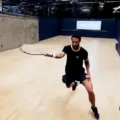The Rise of Antigravity Yoga: A Wellness Phenomenon
Antigravity yoga, also known as aerial yoga, has taken the fitness world by storm in recent years. This innovative practice combines traditional yoga poses with acrobatic elements, all while suspended in a silk hammock. Its popularity has soared, with many practitioners praising its ability to decompress the spine, improve flexibility, and provide a unique mind-body experience. However, the rapid growth of this trendy workout has led to some unexpected challenges, including recent lawsuits against major fitness chains Equinox and YogaWorks.
Understanding the Lawsuits: What’s at Stake?
The lawsuits filed against Equinox and YogaWorks stem from allegations of copyright infringement and misuse of trademarked content. Christopher Harrison, the founder of AntiGravity Fitness, claims that these fitness chains have been offering unauthorized versions of his patented AntiGravity® Yoga classes. While the legal battle unfolds, it’s essential to consider the broader implications for the yoga community and the wellness industry as a whole.
The Heart of the Matter: Balancing Innovation and Intellectual Property
At the core of this legal dispute lies a complex interplay between innovation in the fitness world and the protection of intellectual property. On one hand, creators like Christopher Harrison have invested time, effort, and resources into developing unique fitness methodologies. On the other hand, the yoga community has long embraced a spirit of openness and sharing of knowledge. This case raises important questions about where we draw the line between inspiration and imitation in the wellness industry.
The Impact on Yoga Practitioners and Studios
As the lawsuit unfolds, many yoga enthusiasts and studio owners find themselves caught in the middle. Practitioners who have come to love antigravity yoga classes may worry about the future availability of these sessions. Studio owners, particularly those offering aerial yoga classes, may need to reassess their program offerings to ensure they’re not infringing on any copyrights or trademarks. This situation serves as a reminder of the importance of due diligence when introducing new fitness trends into a studio’s repertoire.
Moving Forward: Fostering Creativity and Respect in the Wellness Community
While legal battles can be divisive, this situation also presents an opportunity for the yoga and fitness community to come together and have meaningful discussions about innovation, credit, and collaboration. It’s a chance to reflect on how we can foster an environment that encourages creativity while also respecting the intellectual property of others. As practitioners and professionals in the wellness industry, we can use this moment to reaffirm our commitment to integrity, authenticity, and mutual respect.
The Silver Lining: Embracing the Spirit of Yoga
Despite the legal challenges, it’s important to remember the fundamental principles that draw people to yoga in the first place. Yoga, in all its forms, is about unity, balance, and personal growth. As we navigate these complex issues, we can draw inspiration from the yoga philosophy of ahimsa (non-violence) and satya (truthfulness). By approaching this situation with compassion and open-mindedness, we can work towards solutions that benefit the entire wellness community.
FAQ: Understanding the Antigravity Yoga Lawsuit
1. What exactly is Antigravity Yoga?
Antigravity Yoga is a form of aerial yoga that uses a silk hammock suspended from the ceiling to support practitioners as they perform various yoga poses and acrobatic movements. It was developed by Christopher Harrison and combines elements of traditional yoga with aerial arts.
2. Why are Equinox and YogaWorks being sued?
The lawsuit alleges that Equinox and YogaWorks have been offering unauthorized versions of AntiGravity® Yoga classes, which are trademarked and patented by Christopher Harrison’s AntiGravity Fitness.
3. How might this lawsuit affect yoga practitioners?
Depending on the outcome, some studios may need to modify or discontinue their aerial yoga offerings. However, it’s unlikely to affect traditional yoga classes or other forms of fitness training.
4. Can other studios still offer aerial yoga classes?
Yes, but they should be careful to ensure they’re not infringing on any copyrights or trademarks. Many studios offer their own versions of aerial yoga that don’t use the AntiGravity® name or specific techniques.
5. What lessons can the wellness industry learn from this situation?
This case highlights the importance of respecting intellectual property in the fitness world. It also underscores the need for clear communication and collaboration within the wellness community to foster innovation while giving credit where it’s due.









